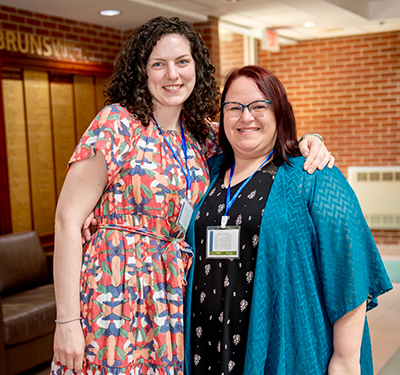
Over 150 stakeholders, including health and mental health care professionals, people with lived experiences, advocates, and First Nation health leaders, recently came together to discuss the state of eating disorder treatment at the New Brunswick Eating Disorder Summit—the first event of its kind in the province.
Dr. Jenni Cammaert, associate professor of social work at STU, and Dr. Emilie Lacroix, assistant professor of psychology at the University of New Brunswick, hosted the summit.
"The summit created avenues for networking and conveyed uniform knowledge across all provincial health sectors. The outcomes of the summit highlighted to government and decision-makers the collective message that eating disorder care in our provinces is in a critical state," said Dr. Cammaert.
This knowledge-sharing and mobilization event began an important conversation that will inform efforts to build local capacity for inclusive eating disorder treatment.
"Attendees repeatedly noted throughout the summit that they felt hope for the future of eating disorder care in the province and looked forward to opportunities to come together again. Hope is powerful in creating change," said Dr. Cammeart.
Introducing the NB-EDT
During the event, Dr. Cammaert and Dr. Josée Jarry, professor in the Adult Clinical psychology programme of the University of Windsor, introduced the New Brunswick-Eating Disorder Training (NB-EDT) they are developing for health and mental health practitioners across New Brunswick.
"Eating disorders are chronically misunderstood by the general public and health and mental health practitioners," said Dr. Cammaert.
"My colleague, Dr. Jarry, and I aim to increase the knowledge and education of every care provider about eating disorders to remove stigma, increase screening ability, and start to remove barriers.”
This self-paced virtual training will provide an extensive foundation in eating disorder knowledge and skills. Modules include an exploration of who is impacted by eating disorders, how they develop, socio-cultural factors and the role of trauma, diagnosis and assessment protocols, diverse consequences and impact, the role of interdisciplinary treatment teams, levels of care, and the importance of person-centred treatment, as well as intersectional considerations.
The training is part of a research project and will be provided free of charge for NB care providers.
-(2).jpg)
/filters:format(webp)/prod01/stuca/media/stu/site-assets/images/features/DalCupnews.jpg)
/filters:format(webp)/prod01/stuca/media/stu/site-assets/images/events/Research-and-Ideas-news-2026.png)
/filters:format(webp)/prod01/stuca/media/stu/site-content/news/DeansListnews.jpg)